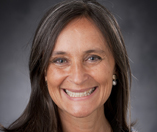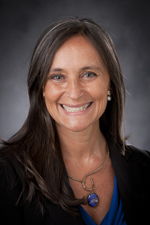Viviana Martinez-Bianchi – new WONCA WHO Liaison

 Dr Viviana Martinez-Bianchi from USA and Argentina was elected in Rio, as a Member-at-Large on the WONCA World executive and is the new WONCA WHO Liaison person. She reports on the WHO presence and presentations at our recent World conference in Rio.
Dr Viviana Martinez-Bianchi from USA and Argentina was elected in Rio, as a Member-at-Large on the WONCA World executive and is the new WONCA WHO Liaison person. She reports on the WHO presence and presentations at our recent World conference in Rio.
More about Viviana
Hello! I am honoured to have been elected to the WONCA Executive, and appointed as WONCA’s WHO liaison person for 2016-2018.
I acknowledge the outstanding work of our 2013-2016 WHO liaison, Dr Luisa Pettigrew and include some of her comments below.
The WHO was present at the WONCA World Council meeting in Rio - a video message from Dr Carissa Etienne, Director of PAHO (WHO Office for the Americas), encouraged Council to continue efforts towards achieving universal health coverage. Dr Hernan Montenegro (Coordinator, Services Organization and Clinical Interventions. Service Delivery and Safety, for the World Health Organization) spoke about “Strengthening health systems through Universal Health Coverage (UHC)”.
He gave some background to the role and global responsibilities of WHO: they set norms and standards, articulate evidence based policies, provide technical support to countries, and monitor the health situation around the world. The leadership priorities start with universal health coverage that is safe and of good quality. The changing global context presents both challenges and opportunities to improve health of populations.
WHO is keen to promote the delivery of integrated people-centred health services (IPCHS), taking into account the different contexts in different countries, and working across sectors. Dr Montenegro acknowledged that much of what is being talked about now in terms of integrated people-centred health services–equates to what family medicine has been striving to achieve globally for many years. “All people have equal access to quality health services that are co-produced in a way that meets their life course needs and respects their preferences, are coordinated across the continuum of care and are comprehensive, safe, effective, timely, efficient and acceptable; and all members of the healthcare team are motivated, skilled and operate in a supportive environment”.
WHO is currently working on the production of a position paper on high quality primary care and is collaborating with some of the big global organizations to help develop appropriate and measurable indicators to reflect the achievement of Universal Health Coverage (UHC).
Dr Montenegro outlined the work of Primary Health Care Performance Initiative (PHCPI). He described it as “a new partnership that brings together country policymakers, health system managers, practitioners, advocates and other development partners to catalyze improvements in primary health care (PHC) in low- and middle-income countries through better measurement and knowledge-sharing. PHCPI will help countries track key performance indicators for their PHC systems, identifying which parts of the system are working well and which ones aren’t. This will enhance accountability and provide decision-makers with essential information to drive improvements. To make data actionable, this partnership will also provide a platform for countries to share lessons and best practices”.
Dr Hassan Salah, (Technical Officer, Primary and Community Health Care, Integrated Service Delivery Team, Department of Health System Development WHO– EMRO), then briefly talked about challenges and opportunities in WHO Eastern Mediterranean region.
Dr Jim Campbell, (Director Health Workforce Department of WHO), highlighted that the 2030 Sustainable Development Goals’ (SDG) agenda recognizes Universal Health Coverage (UHC) as a pillar of sustainable development. It is a target that underpins all other health targets and is key to their achievement. He stated that progress towards UHC means: reducing the gap between the need for and use of services, improving quality, and improving financial protection.
SDG Target 3.c is to substantially increase health financing and the recruitment, development, training and retention of the health workforce in developing countries, especially in the least developed countries and island states. Key issues in the strategy include: optimize the existing workforce; anticipate future workforce needs; strengthen individual and institutional capacity; and strengthen data, evidence and knowledge.
He introduced the Global Strategy on Human Resources for Health : Workforce 2030, adopted at World Health Assembly (WHA) 2016. It was developed to accelerate progress towards UHC and the SDGs by ensuring equitable access to health workers within stronger health systems. And recognizing that “Health” is a labor sector, and one of the biggest employers in the world. He then presented the report of the High-Level Commission on Health Employment and Economic Growth.
At the end of the three talks from WHO, Dr Luisa Pettigrew presented her report as WONCA-WHO Liaison. She identified important opportunities to engage with WHO, including:
• Ensuring the voice of family medicine is heard, as a key component of primary care.
• Developing robust health systems to achieve SDGs and Universal Health Coverage requires a strong family medicine platform.
• Advocating for greater research into primary care and family medicine.
• Advocating for greater engagement between WONCA Working Parties and WONCA Special Interest Groups with WHO headquarters and regional offices and with individual WHO departments; and between WONCA Member Organizations and WHO country offices.
• Working together with other primary care professional Organizations, such as the International Council of Nurses, to provide evidence to policy makers on primary care delivery.
• Engaging with national governments, to ensure strong family medicine in included in national health policies and operational practice.
I hope to continue the momentum gained by Luisa Pettigrew with WONCA working closely with WHO.
I started in my new role in Rio, meeting members of as many of the Working Parties as it was possible. I know that WPs and SIGs are due to send their programmes of work for the next biennium in to the CEO and President, and we would all like to know what key messages from your area of interest would you want your WONCA –WHO Liaison to carry to WHO? Please add this to your reports or send me a separate email to the address: [email protected]
Viviana Martinez-Bianchi, MD, FAAFP
Presentations
Dr Hernan Montenegro
• WHO Report to WONCA World Council 2016
• The Policy Context: Integrated People-centred Health Services
Dr Jim Campbell,
• Report to WONCA Council: Global Strategy on Human Resources for Health & High-Level Commission on Health Employment and Economic Growth
Luisa Pettigrew
• Report to Council